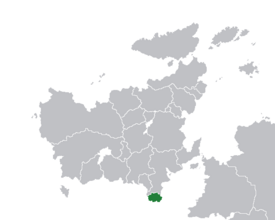User:Planita13/Sandbox1
Republic of Austeria Republika e Austerisë
Other names
| |||||||
|---|---|---|---|---|---|---|---|
| Motto: "Trimëri, vëllazëri dhe liri" (Tethian) | |||||||
| Anthem: Liberty "Liri" | |||||||
 | |||||||
| Capital and city | |||||||
| Official languages | Tethian | ||||||
| Recognised national languages | |||||||
| Ethnic groups (2020) |
| ||||||
| Religion (2020) |
| ||||||
| Demonym(s) | Austerian | ||||||
| Government | Unitary parliamentary constitutional republic | ||||||
| Nertilian Bushaj | |||||||
| Hershor Dreshaj | |||||||
| Xhuàn Patrè | |||||||
| Legislature | Senate | ||||||
| History of Austeria | |||||||
• Austerian Principalities | 1252 | ||||||
• Kingdom of Maqil | 1472 | ||||||
• Annexation into Etruria | 1789 | ||||||
| 1801 | |||||||
• Reannexation into Etruria | 1854 | ||||||
• Independence from Etruria | 1946 | ||||||
• Current constitution | 1956 | ||||||
| Area | |||||||
• | 62,532 km2 (24,144 sq mi) | ||||||
| Population | |||||||
• 2020 estimate | 12,270,164 | ||||||
• Density | 182.75/km2 (473.3/sq mi) | ||||||
| GDP (PPP) | 2020 estimate | ||||||
• Total | $226 billion | ||||||
• Per capita | $19,767 | ||||||
| GDP (nominal) | 2020 estimate | ||||||
• Total | $193 billion | ||||||
• Per capita | $16,938 | ||||||
| Gini (2020) | 42.4 medium | ||||||
| HDI (2020) | 0.850 very high | ||||||
| Currency | Galenian Flori (TRF (ƒ)) | ||||||
| Date format | dd/mm/yyyy | ||||||
| Driving side | right | ||||||
| Calling code | +101 | ||||||
| ISO 3166 code | GAL | ||||||
| Internet TLD | .ga | ||||||
Austeria, officially the Republic of Austeria (Tethian: Republika e Austerisë), is a sovereign state located in southern Euclea bordered by Etruria to the north and surrounded by the Acheloian Sea to the south and west and the Solarian Sea to the east. Austeria has a population of 12 million people. The capital and most populous city is Kartha.
Historically, Austeria has been controlled by different civilisations over time, mainly the Piraeans, Solarians, Amathians, and the Etrurians. The first recorded settlements in Austeria was originally inhabited by the Gadishullorian tribes, but the first walled settlement was founded by Piraeans in the 5th century BCE, which would become the city of Kartha. In the 2nd century BCE, Irfan arrived by oceanic trade networks from Coius and established itself as the major religion. They would be in regular conflict with Pirean city-states until it was conquered by the Solarian Empire in the 2nd century BCE. Under the Solarian Empire and its successor the Empire of Arciluco, the peninsula was a major center for trade from Coius. After the end of Arcilucan influence, the region was thrown into religious turmoil by the Iconoclast Wars. The conflict allowed the Irfanic Maqil Kingdom from modern day Tsabara to establish itself on the peninsula. The Maqil fought with Povelia for control of the region until both states were annexed by the Etrurian First Republic during the Etrurian Revolution. Austeria briefly gained independence as a revolutionary republic in 1801 before it was reannexed by the restored monarchy of Etruria in 1855. However this brief period of independence sparked a national awakening known as the Austerian Renaissance, beginning a period of nationalist sentiment and agitation. After the rise of the functionalist Greater Solarian Republic, Irfanic communities across to the gegion were subject to a genocide of forced deportations to concentration camps in Austeria. Following the end of the Solarian War, the modern state of Austeria declared independence in 1946. The republic was briefly supplanted by an ultranationalist dictatorship before Kristaq Kotta restored the republic and established the current Republic of Austeria.
As of the 1956 constitution, Austeria is a unitary parliamentary constitutional republic with a president elected every four years as both head of state and head of government. Legislative power is vested in the unicameral Senate, led by a Prime Minister appointed by the President. The country is rife with corruption and is considered one of the most corrupt in Euclea. The Austerian economy is heavily based in the service, international trade, and tourism sectors. Galenia is considered one of the most visited countries in Euclea and the world due to its lush beaches and summer resorts. Other major sectors of the economy is agriculture, especially wine production, and beer brewing. The government has a considerable control on the country's economy, holding shares in key-sectors of the economy Galenia is an active member of the Community of Nations, International Council for Democracy and the International Trade Organisation. The country is currently in the process of joining the Euclean Community.

